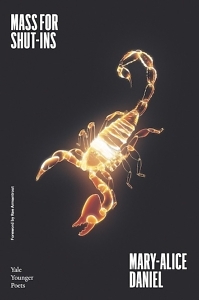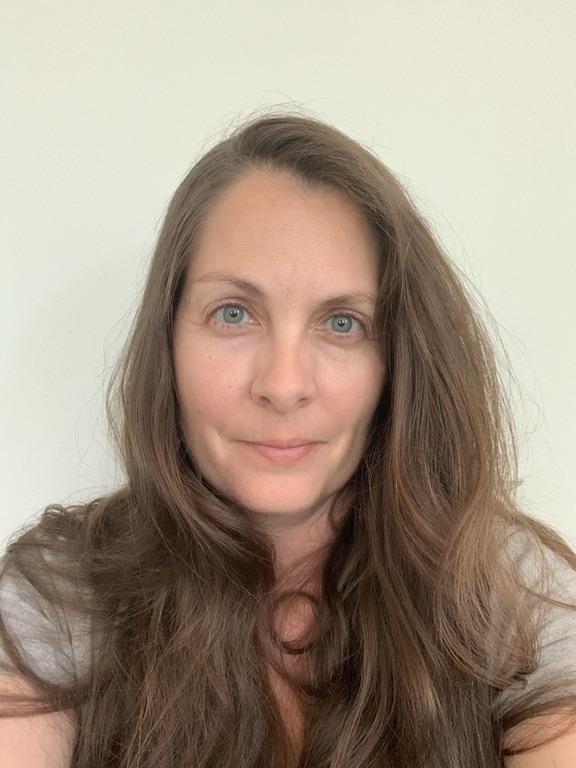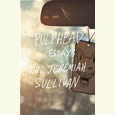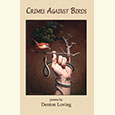Boundaries and Chaos
Mary-Alice Daniel’s debut poetry collection interrogates our sense of order
The job of an entomologist is to collect, identify, and classify insects, to distinguish one from another. Think of a pinboard of specimens, each carefully preserved and labeled for study. Every minute part of a specimen is necessary, fragile but full of the details that make a thing what it is.
 A book of poetry, too, is an act of collecting, a gathering up of items full of a fragile strength, each word tenuous but vital to the making of the thing. A poem is labeled with a title, and through its structure of line breaks and spacing, page turns and stanzas, a classification of sorts is performed. Borders are constructed: Where does one line end and another begin? Where does one poem end and another begin? With her debut collection of poems, Mass for Shut-Ins, Mary-Alice Daniel wrestles with these acts of classification and delineation, at times pinning her poems firmly to the page and at others encouraging them to fly free.
A book of poetry, too, is an act of collecting, a gathering up of items full of a fragile strength, each word tenuous but vital to the making of the thing. A poem is labeled with a title, and through its structure of line breaks and spacing, page turns and stanzas, a classification of sorts is performed. Borders are constructed: Where does one line end and another begin? Where does one poem end and another begin? With her debut collection of poems, Mass for Shut-Ins, Mary-Alice Daniel wrestles with these acts of classification and delineation, at times pinning her poems firmly to the page and at others encouraging them to fly free.
Born in Nigeria and raised in England and Nashville, Daniel contends with the constructed reality of geographical borders in her memoir, A Coastline Is an Immeasurable Thing. With Mass for Shut-Ins, winner of the 2022 Yale Younger Poets Prize, Daniel creates borders even as she questions them, dividing her collection into five sections, each denoted by a pictogram often used to indicate a hazard or warning.
Within each section, however, the center wobbles, threatening to undo the built environment. Through manipulation of stanzas, spacing, punctuation, and formatting, Daniel flirts on the edge of chaos, letting many poems lengthen to exactly the end of a page without seeming to conclude. Readers may turn a page expecting more and find a new poem has unexpectedly begun. Turning back, then, they must renegotiate the conclusion of the poem as it is. If this sounds like a criticism, please reconsider. Daniel here is doing remarkable work, asking readers to live inside a porousness of borders, both physical and mental.
 Similarly, Daniel makes regular use of punctuation to break up her poems, an act of delineation that sets one line or phrase apart from the others within brackets (both straight and curly), italics, or parentheses. Take for example the opening poem, “Must Be Some Kind of Spell,” where parenthetical asides assert, “(Your house isn’t haunted — you’re just lonely.)” and later “(Objects are animate.).” This last statement resurfaces in a much later poem, “Mean World Syndrome,” with another parenthetical: “(I told you: Objects are animate.).” In this poem, Daniel plays with spacing, too: It’s the only poem in the collection with more breathing room between each line. Every mark, every image, every breath feels carefully chosen here, with Daniel the scientist keenly aware of the importance of every identifying mark.
Similarly, Daniel makes regular use of punctuation to break up her poems, an act of delineation that sets one line or phrase apart from the others within brackets (both straight and curly), italics, or parentheses. Take for example the opening poem, “Must Be Some Kind of Spell,” where parenthetical asides assert, “(Your house isn’t haunted — you’re just lonely.)” and later “(Objects are animate.).” This last statement resurfaces in a much later poem, “Mean World Syndrome,” with another parenthetical: “(I told you: Objects are animate.).” In this poem, Daniel plays with spacing, too: It’s the only poem in the collection with more breathing room between each line. Every mark, every image, every breath feels carefully chosen here, with Daniel the scientist keenly aware of the importance of every identifying mark.
In other ways, the poems blur borders, blending the Christian and Islamic practices of Daniel’s past with the detached agnosticism she inhabits today, uniting Western and African traditions into complex images. All of these elements combine to great effect, but where Mass for Shut-Ins shines is in the sound and the shape of individual lines.
In “Deathcentric,” Daniel writes, “Who will come along with us casually to death’s deep end? / We who know nothing of snowflakes the size of milk pans,” showing off her facility with alliteration and the power of an unexpected image. Or take these lines near the end of “Slipstream,” a poem that centers on a propeller accident and asks, “But how could she neglect insistent wind in the slipstream?” before a series of lines beginning with “Perhaps” and concluding, “Perhaps that frustration — stuck inside one whole body, / one bone-house abiding one place at a time.” The initial question’s repetition of the short i sound and the drumbeat of “perhaps” provide stability and structure before Daniel, once again, lets loose the words into an undeniable image, leaving the question unanswered.
At times, Daniel turns that wry questioning on her own work, as in “Revivalism 101,” a poem that turns over a stone to examine the religious imagery and fascination with death that pervade the collection. At the poem’s close, she writes, “While our own world destroys itself, all we do is eat, sleep, groom. / Or write obsessively about bodies as objects of death study,” seeming to question the value of poetry in the face of calamity. Mass for Shut-Ins offers no easy reply, suggesting that perhaps the world is just as difficult and dark as it sometimes seems to be.

Sara Beth West is a writer and reviewer, usually found at sarabethwest.com. She lives in Chattanooga with her family, dogs, and a cat who always, always, always thinks it is time for dinner.


